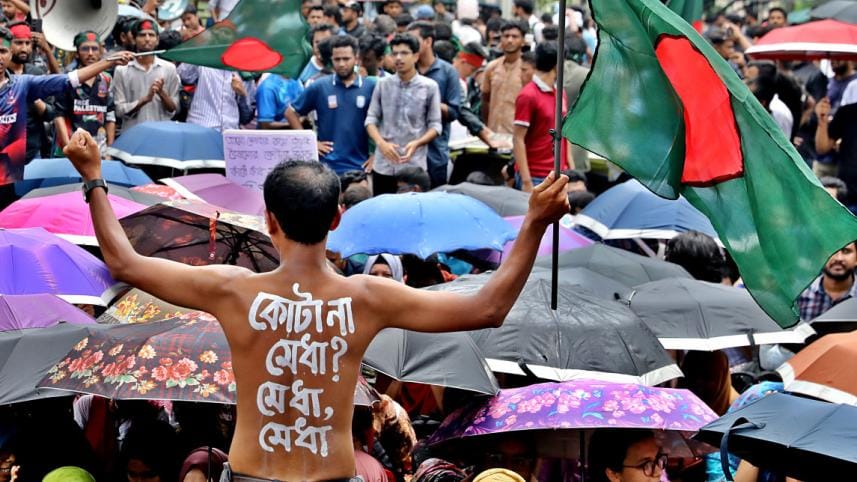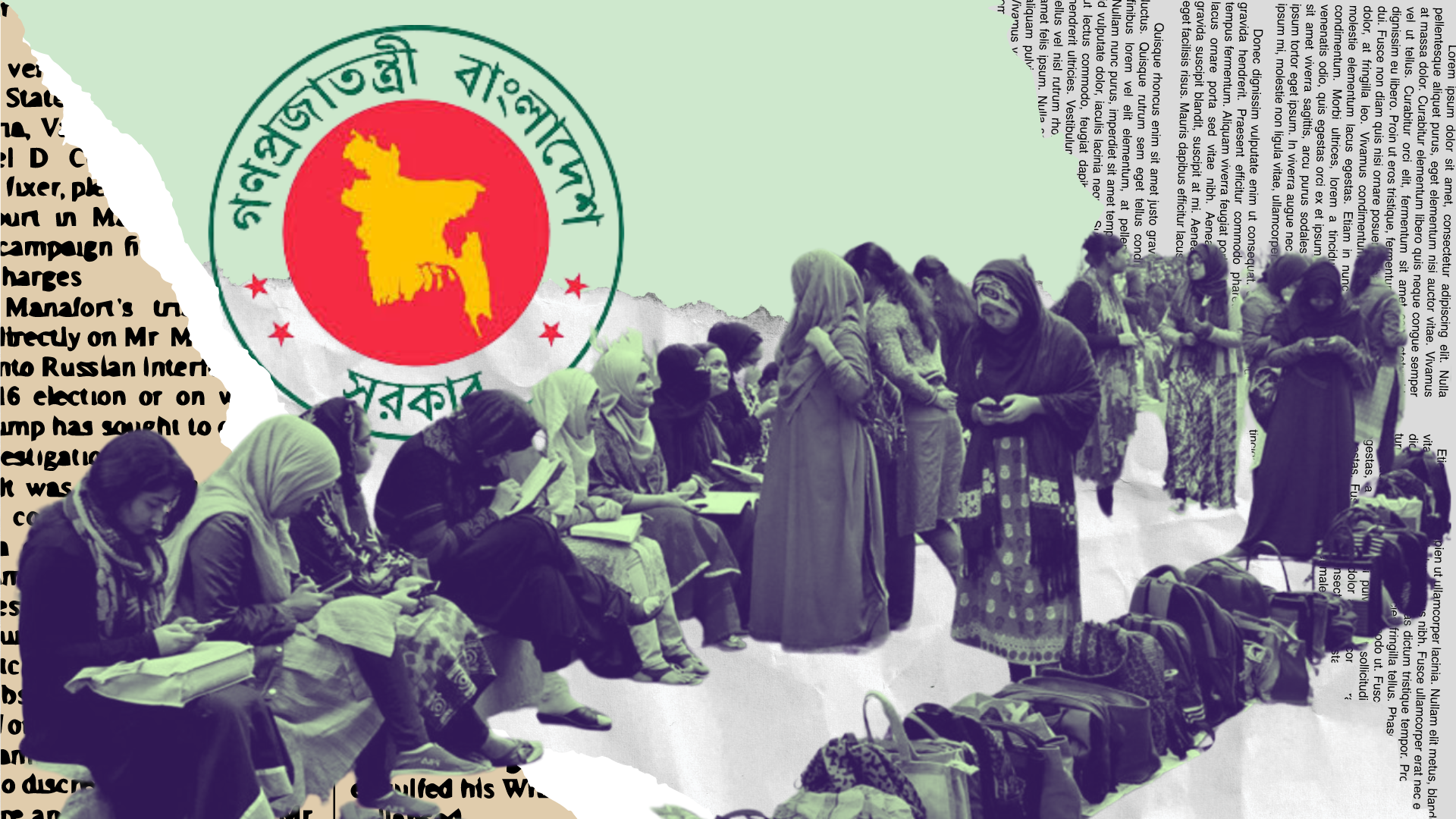It’s time to dismantle Bangladesh’s shadow quotas

At a leading private bank's assessment centre in Dhaka, a first-generation graduate from Rajshahi University arrives with his economics degree, top-decile CGPA, and a folder thick with competition medals earned through four lean, disciplined years. He stands in the neutral queue. He holds tokens distributed by SMS; awaits aptitude tests at nine and the panel at eleven. He is where everyone is meant to be, an ID number until the marks speak.
Across town, a managing director's nephew, fresh from a middling UK business programme, never joins the queue. An uncle's colleague has already forwarded his CV through a private club WhatsApp group. By noon, he holds a "mentoring" coffee, and by week's end, an offer letter "subject to formalities." He travels a path softened by an uncle's phone call. The public interviews continue as scheduled, a performance staged for compliance records. The RU graduate never stood in the real queue—the one that resides in drawing rooms and club lounges, accessible only through birthright.
This is Bangladesh's most pervasive quota system: unwritten, unlegislated, yet more rigid than any formal reservation. Who gets to stand in the queue?
South Asia's opportunity structure has long operated through patron-client corridors. For instance, the Mughal mansabdari bound office to bloodline, the East India Company's writers recruited cousins for Kolkata postings, and the Pakistani period fused business licences with political genealogy. After 1971, we proclaimed meritocracy while reconstructing the same patronage networks in democratic costume. What the zamindars once did with land tenure, today's elite accomplish with board seats and admission letters. The merchant guilds of medieval Sonargaon, which passed trade secrets through kinship lines, find modern expression in conglomerate hiring practices that reserve management trainee slots for the chairman's extended family. Colonial administration layered its clubbiness upon this foundation—the right school tie, the right veranda, the right sponsor. Today's networks are not feudal banners but spreadsheets of references and WhatsApp groups labelled "Gulshan Parents" or "DOHS Uncles." The outcome remains patrimony: opportunity guarded, transferred, and fenced.
This phenomenon is not unique to Bangladesh but is typical of most post-colonial, weak-institutional and resource-scarce nations. In Bangladesh, the mechanics of these shadow quotas operate roughly through five interlocking gates.
It starts with recruitment. Public job postings speak of fairness while actual shortlists circulate through reference networks. A whispered instruction persists to "keep two seats for the family." Large corporations maintain unwritten policies: two internship slots for family, one for a ministerial referral, perhaps one for open competition.
Then there are scholarships. Lucrative awards are often processed through dual tracks—the official merit list and the "special consideration" folder thick with letters from trustees. A donor's ward receives "advisory" consideration while a stellar first-generation student discovers that the committee weighs "fit"—a euphemism for social resemblance.
Next is procurement. The government invitations reach selected mobile numbers before tender notices appear; by publication day, specifications are tailored to match a predetermined supplier's inventory.
Then, there are postings. Orders to lucrative districts correlate mysteriously with surname patterns—the same families rotating through customs, the National Board of Revenue and development authorities generation after generation.
Lastly, the boards, where corporate rosters read like genetic sequencing—the father as chairman, son as managing director, son-in-law heading audit, independent directors drawn from the wife's family business.
Empirical, peer-reviewed research on these practices is not abundant. However, any reader not living under a rock can at least anecdotally verify their preponderance. Human resource research on multinationals operating in frontier economies shows that removing family-referred candidates from selection increases new-hire productivity by a considerable percentage within six months. Meanwhile, research in higher education often finds that students admitted through nepotistic channels incur dropout rates triple that of competitive entrants.
Firms hiring for relationship capital over skill insure themselves against uncertainty but pay with weaker teams, groupthink and undiversified ideas portfolios. The result is a two-sided market failure. As employers, universities and regulators coordinate around relationship capital, entry barriers harden for outsiders, and the economy underinvests in the very talent it claims to seek.
We stage comfortable debates over formal quotas—whether for freedom fighters' descendants, women, or minorities. Yet, this deeper apartheid thrives unchallenged. Urban professionals are outraged at reservation politics while operating a far more comprehensive reservation system. They argue that formal quotas compromise merit, yet their own children never compete on merit—they inherit positions like property.
This is not necessarily a moral scandal. My gripe is that it constitutes an efficiency failure that distorts selection, suppresses competition and misallocates human capital. The timing is especially hazardous as Bangladesh faces a steep climb along the productivity curve. Firms hiring for relationship capital over skill insure themselves against uncertainty but pay with weaker teams, groupthink and undiversified ideas portfolios. The result is a two-sided market failure. As employers, universities and regulators coordinate around relationship capital, entry barriers harden for outsiders, and the economy underinvests in the very talent it claims to seek.
Sceptics argue back: "Networks build trust" and "business runs on relationships." That might be true, but trust can be institutionalised through transparent processes like blind stages, structured rubrics and audit trails; therefore, confidence rests on evidence rather than familiarity. "Merit is subjective," others contend. Then make it less so, anonymise the first sift, score against predefined criteria, and separate referees from scorers.
"Nepotism is universal," comes the final punch. The distinction is not whether it exists but whether it is contained. Singapore publishes related-party employment in statutory filings. Scandinavian firms face reputational costs for dynastic hiring. Wherever jurisdictions adopted blind rounds in hiring and admissions, they widened access without chaos.
The antidote to shadow quotas is not new quotas—only dismantling hidden ones. Corporations should publish annual nepotism audits, such as the percentage of hires, promotions and board appointments that involve family or social ties. Include related-party hiring disclosure in governance reports. Institute blind CV rounds for entry roles, and rotate internship slots through open lotteries among qualified applicants. Business chambers and philanthropies should fund a mentorship clearing house connecting non-legacy candidates to industry professionals, proving that networks need not be hereditary to be trustworthy. International evidence shows that structured mentorship programmes with open access consistently outperform closed-network referrals in placement quality. Therefore, we must scale this logic and make opportunity systematic, instead of sympathetic.
Imtiaz Sifat is chair of international economics at the Department of Economics and Business Economics in Radboud University at Nijmegen in the Netherlands. He can be reached at imtiaz.sifat@ru.nl.
Views expressed in this article are the author's own.
Follow The Daily Star Opinion on Facebook for the latest opinions, commentaries and analyses by experts and professionals. To contribute your article or letter to The Daily Star Opinion, see our guidelines for submission.




 For all latest news, follow The Daily Star's Google News channel.
For all latest news, follow The Daily Star's Google News channel. 

Comments